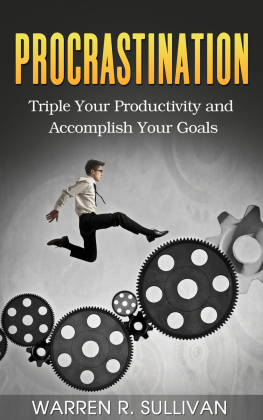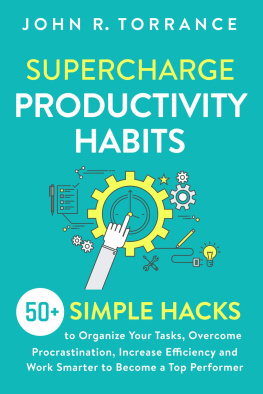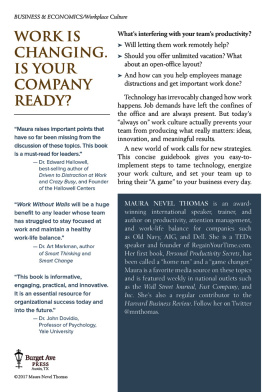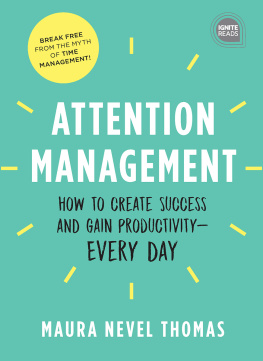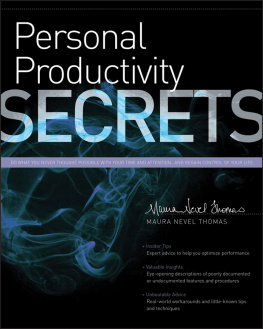My first book, Personal Productivity Secrets (Wiley, 2012), was the first published work detailing my Empowered Productivity system which I had been delivering to clients for many years.
Since then, the world of work has continued to evolve. It has left the confines of the office. I write this now in quarantine because of the global COVID-19 pandemic. Knowledge workers are required to be more creative, more innovative, and more disruptive, yet with less and less time and space to marshal resources in a thoughtful way because of the countless and increasing demands on our attention.
In the decade since I wrote that book, Ive been honored to work with some of the worlds most influential leaders and brands. That experience has both refined my thinking and given me the opportunity to defend it in some of the countrys most prestigious business outlets. The result is the latest evolution of the Empowered Productivity system, which has been put through much more rigorous testing and refining, incorporating input and feedback from over forty thousand professionals.
This book, detailing action management, is the second in the Empowered Productivity series from Ignite Reads, after Attention Management: How to Create Success and Gain ProductivityEvery Day published in 2019.
Future planned books in the series will explore communication management and culture change management (for organizational leadership).
Im confident that the latest version of my Empowered Productivity system, as presented in this series, is the best its ever been. Im excited and humbled to join you on your journey to peak productivity and to help empower your ability to achieve the results that are most significant to you, personally and professionally. Im excited to see the results as more and more people like you can bring your unique gifts to the world in a way that inspires, motivates, and excites you rather than exhausts, overwhelms, and stresses you.
Introduction
Prepare for Productivity
Have you gone to work determined to complete just one or two really important things? But then, before you know it, its the end of the day and you havent even had to time to think about those tasks?
Now consider another common scenario: Have you ever reflected around New Years Day or your birthday that another year has gone by and youve made little or no progress toward getting that promotionor going back to school, starting that side business, or achieving another life goal you set? Or have you maybe had a friend on your mind, but you realize its been forever since youve spoken with them?
The two situations are deeply related. If you spend the best part of your days focused on trying to keep up with what the world throws your way, you lose your ability to shape the life you want to live.
True productivity isnt about checking more things off your to-do list every day. Its not about being busy reacting to the unrelenting amount of communication and information you receive every day.
Instead, I believe the pursuit of productivity empowers us to choose our answers to two questions: What kind of person do you want to be? and What kind of life do you want to live? I define productivity as accomplishing more of whats important to youwhat I refer to as your significant results .
We all wear many hats in our lives. Not only are we professionals and colleagues, but we are also likely some combination of partner, spouse, parent, child, sibling, aunt, uncle, niece, nephew, friend, neighbor, community member, volunteer, global citizen, and more. And in each of these roles that we play, we have dozens, hundreds, maybe thousands of actions, tasks, and responsibilities that we need to manage in order to be the kind of person we want to be in all parts of our lives. For example, we arent likely to find it acceptable to be a great colleague but a mediocre parent. Or to be a great partner but an unreliable friend. But holding ourselves to these high standards in all parts of our lives is not only hard, it can also be exhausting, overwhelming, and stressful.
So what then is the solution? Harnessing our time, our to-do list, and our productivity .
Productivity is not some innate talent. Its a skill you can learn and practice like any other. Before you decide where you want to go with this book, it helps to understand where you are now with your productivityyour ability to achieve your most significant results.
I generally see three different stages of productivity in my clients:
Stage One: Busy but Not Productive
Have you ever had a day fly by in a flurry of activitybut leave you unsure at the end whether you really accomplished anything? We all have days like this sometimes. But if youre in Stage One productivity, almost all of your days fit this description. When youre at Stage One productivity, you stay primarily in a reactive mode (or if you read the first book in the series, Attention Management , youre in the Reactive and Distracted quadrant). This means that dealing with other people and other peoples goals dominates your day: going to meetings, answering emails, returning phone calls, clearing other communications like instant messages and chat, and putting out fires.
Your job may require you to spend a lot of time being reactive. For example if youre a manager, your job requires you to put your teams goals first, keep your team members on track, ensure they meet deadlines, and help resolve their interpersonal issues.
If, however, you have even one responsibility that doesnt depend on your staff, for which you alone are responsible, and it cannot be delegated, then you must find some time to be proactive in order to get that project or task done. However, youll have a hard time doing that if youre stuck in Stage One productivity. This stage is often characterized by long work hours because you may spend your days dealing with others and spend your evenings and weekends getting your own work done (or the reverse). Stage One productivity is often a step on the path to burnout.



